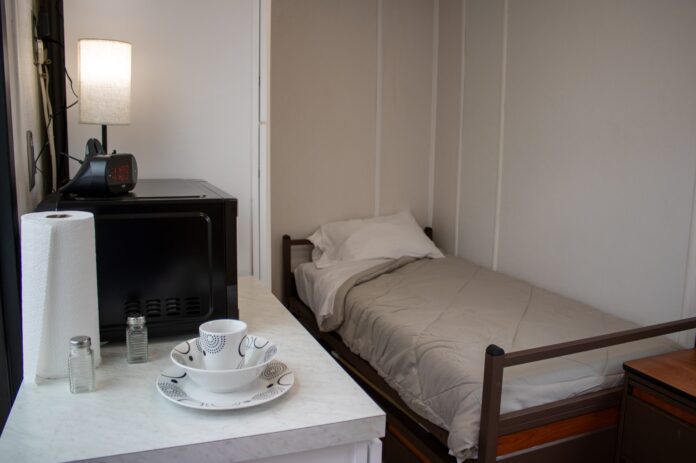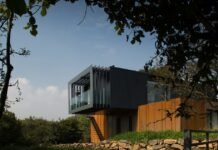In a bold initiative to combat homelessness, the city of Atlanta has recently unveiled its pilot shipping container village, named The Melody, located downtown. This project aims to provide rapid housing solutions for 40 individuals previously experiencing homelessness. Mayor Andre Dickens proclaimed during a ribbon-cutting ceremony that this venture marks just the beginning of a larger plan to create 500 new residences for unhoused individuals through the conversion of cargo containers before the end of 2025.
The Melody: A Fresh Start
Situated at 184 Forsyth Street, The Melody complex replaces a city-owned parking lot with 40 small apartments designed to resemble college dorm rooms. This strategic location is nestled near essential transport hubs, including the Greyhound bus station and MARTA transit facilities, as well as community resources like the Atlanta City Detention Center and the Gateway Center homeless shelter. Residents of The Melody will have access to various supportive services, including job training and assistance with mental health and substance use issues, designed to foster a renewed sense of opportunity and stability.

The common area at The Melody, designed for community engagement and relaxation. (Credit: Claire Becknell)
A Commitment to Change
Mayor Dickens emphasized that the initiative isn’t about introducing new residents to the area but rather providing permanent housing for those who are already part of the community yet living in precarious conditions. Many individuals experiencing homelessness are often found in tents, cars, or temporary accommodations, posing significant challenges to their well-being. The city aims to transition these individuals into stable housing, effectively improving their quality of life and enhancing community dynamics.
Community Challenges: Resistance to Change
While the initiative is commendable, it faces challenges typical of similar housing projects across the country. Residents in nearby areas, particularly in Mechanicsville, have expressed concerns about the public perception of housing the homeless in low-income neighborhoods versus more affluent areas. Critics argue that the city is unfairly moving the burden of homelessness into neighborhoods already struggling with socio-economic issues. Mechanicsville resident Renee Giles articulated this sentiment, highlighting the deep-rooted inequalities illustrated by the city’s housing strategies.
Moreover, historical apprehension surrounding homeless housing—often fueled by the NIMBY (Not In My Backyard) sentiment—has proven to be a recurring issue. In Reynoldstown, neighborhood leaders opposed a proposal to build supportive housing units, claiming they were too dense for the locale, while advocates countered that such opposition stems from a misunderstanding of homelessness and housing needs.
Towards an Expansive Vision
In response to community feedback, the Dickens administration is focusing on site identification and collaboration with local stakeholders to expand the shipping container housing model. Plans for a potential next site have emerged, located on Northside Drive, enhancing the city’s strategy to house the unhoused methodically and with community involvement.
Financial Viability and Quick Assembly
The Melody project itself, costing approximately $5 million, showcases rapid assembly efficiency; it was constructed in just three months—substantially shorter than traditional building methods that could take up to 18 months. This approach reflects a significant innovation in addressing housing shortages while ensuring cost-effectiveness.
Educating the Community
Cathryn Vassell, head of Partners For Home, emphasized the necessity of engaging each neighborhood with tailored outreach and education regarding supportive housing. There is a critical need to dismantle misconceptions about homelessness and supportive housing services. Vassell clarified that The Melody is not a shelter but a provider of permanent, affordable housing meant to include longer-term leases, thereby integrating residents into the community fabric rather than treating homelessness as a transient issue.

Wanda Sutton, one of the new residents of The Melody, looks forward to her new beginning. (Credit: Claire Becknell)
Conclusion: A Model for the Future
The Melody stands as a pragmatic response to homelessness, embodying Atlanta’s innovative and compassionate approach to housing. With community engagement, educational efforts, and a robust strategy for further developments, the city hopes to not only house its most vulnerable residents but also address the underlying societal issues contributing to homelessness.
As Mayor Dickens highlighted, this is a starting point, and with sustained community collaboration and commitment to equity, Atlanta may well set a benchmark for cities nationwide grappling with similar challenges. By turning shipping containers into homes, Atlanta is not merely constructing buildings; it is building futures.














